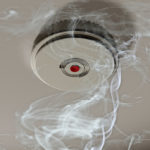This article is part of a sponsored series brought to you by The Detection Group. View Series
This post is part of a series sponsored by The Detection Group.
“In today’s environment of online shopping and big-box building supply stores, it’s easy to find equipment options. Follow the path of least resistance and make do. But my Uncle Al used to say to me, ‘Laurie, there is always the one right tool for every job. One correct piece of equipment for every function.’ And he was right. It applies more than ever to wireless water leak detection systems for commercial buildings.”
–Laurie Conner – President & CEO, The Detection Group®

I was speaking the other day with a commercial building engineer who related to me that he had recently seen a well-known, residential water leak sensor installed in a tenant’s space. The tenant, in an effort to meet the property manager’s build- out requirements, thought his choice would save money (very little money at that!) and elected to install that residential system in their new office space.
The engineer did not approve the installation of that equipment for many reasons, all related to the specific needs of complex, high-rise commercial building environments versus single family homes.
But his story motivated me to want to clarify some of the myths prevalent when it comes time to evaluate the choice between Commercial/Enterprise and Residential/Consumer products in general, and specifically for critically important commercial building wireless water leak detection systems.
First a couple of obvious examples to set the stage and reinforce the point.
- Residential carpets are just as good and durable as commercial grade carpets?
False: Commercial grade carpets are designed and manufactured to endure the rigors of hundreds of thousands of muddy, wet and dirty steps a year. And sustain nightly, deep cleanings of same. If you want stronger carpets for your home, consider commercial grade products. But shy away from using residential carpeting in an office environment.
- Commercial kitchen appliances are superior to household appliances.
True: If you have ever worked ‘in the back of the house’ (aka a restaurant kitchen), you will understand. Commercial appliances, pots, pans and utensils have to survive cooking thousands of meals a day at extremely high temperatures and take continuous abuse. Mom’s Teflon pan just is not going to make the cut.
- Residential and commercial smoke detectors perform to the same standards
False: This answer could go either way. Yes, commercial grade and residential smoke detectors both detect smoke and generally sound an alarm or notify a local security service when smoke is evident.
 But commercial grade smoke detectors frequently do much more than that. They may have VESDA capability (Very Early Smoke Detection Apparatus) that constantly samples the surrounding air and processes it looking for smoke, as opposed to waiting for smoke to be detected, which allows for quicker evacuation in commercial settings.
But commercial grade smoke detectors frequently do much more than that. They may have VESDA capability (Very Early Smoke Detection Apparatus) that constantly samples the surrounding air and processes it looking for smoke, as opposed to waiting for smoke to be detected, which allows for quicker evacuation in commercial settings.
Now to focus on some common misunderstandings/myths comparing Residential (“Consumer”) and Commercial (“Enterprise”) water leak detection systems.
- A battery is a battery is a battery, so battery life will be the same. False: For example, generally, Trident wireless water leak sensors have more sophisticated, higher quality and longer lasting batteries than residential systems. In addition, Trident sensors, while always standing-by, communicate through a dedicated RF frequency only when the sensor is sending out an alert notification.
Residential systems communicate via WiFi which is always on and therefore drawing more power. So even if the systems have similar quality batteries, the Trident battery will have a longer battery life.
- Notification protocols are typically identical in both types of systems.
False: Residential water leak systems, and even many other commercial systems, do not have all the notification features that the Trident commercial system provides, namely: phone call, text and email simultaneously to as many people as desired. Residential systems send an alert only via text & email to one individual.
- Residential and commercial systems are both ‘calling tree’ capable.
False: Trident is calling tree capable, meaning if the primary recipient does not answer, it automatically continues to secondary and tertiary contacts until someone is reached. Importantly, the notification can be directed to individuals responsible for specific areas of the building. Residential systems have limited notification capability.
- A water leak is a water leak, whether in a single-family dwelling or high-rise building. True & False: There are vast differences between water leaks in a single-family dwelling and those in a commercial building. But it is true that both create havoc, expenses for the owners and occupants, increased insurance rates, etc. But that is where the similarity stops.
Finding the leak quickly in a 30-story building is critical. So Trident sensors, unlike what I fondly refer to as residential  ‘screamers’, not only provide a local audio alert, but the system will advise building management exactly what floor and where on that floor the leak is taking place, so it can be fixed immediately. In some cases, with optional Trident shut-off valves, the system will instantly shut off water supply to the leak.
‘screamers’, not only provide a local audio alert, but the system will advise building management exactly what floor and where on that floor the leak is taking place, so it can be fixed immediately. In some cases, with optional Trident shut-off valves, the system will instantly shut off water supply to the leak.
Time is money when it comes to fixing a leak in either type of building. But the volume of water from a leak in a 2″ pipe can start as a trickle and under average pressure could escalate to produce over 7,000 gallons in an hour if the pipe breaks, nearly 10X more water volume than the 800 gallons an hour from a ½” residential pipe break. The commercial leak sensor system must work flawlessly 365/24/7 since damage costs increase geometrically in a commercial building because the leak may be on a high floor and the damage losses cannot be contained in one area or on just on that floor.
- All residential and commercial wireless water leak detection systems are created equal.
False: Only one wireless water leak detection system has received FM Approval as best-in-class for commercial buildings, and that is the Trident system. When you see a product or service with the FM APPROVED mark, you will know it meets FM’s high property loss prevention product testing and certification standards. In many cases, building owners and insurance carriers actually specify Trident as the only brand that meets their requirements.
- Both commercial and residential systems have pre-alarm and ‘zero’ alarm features.
False: Trident has both, but residential systems do not normally have these features. The pre-alarm feature allows you to press a button to stop outbound alarm notifications within 15 seconds of an accidental spill or swipe with a wet mop.
Trident’s “Zero” alarm functionality allows you to set the pre-alarm to “0” seconds in highly sensitive areas like server and electrical rooms, which means alarm notifications are triggered immediately. Not only do residential systems not have this function, but many commercial systems don’t either.
- Both types of systems can support any building size.
False: The Trident commercial platform can support hundreds of thousands of square feet of coverage because it communicates via an RF backbone and mesh network. Residential systems cannot because they rely on WiFi communications, which are limited in range and coverage.
- Residential systems are just as secure as Commercial systems. False: Security can be an issue with many residential systems as they may communicate with various device manufactures via numerous entry points, which could facilitate security breaches.
The Trident commercial system provides a high level of security and is less susceptible to endpoint intrusion as it does not have to communicate with Building Management Systems. And notifications are routed through cloud communications via ethernet or cellular channels, versus typically local networks for residential systems. Trident also uses a closed, secure, proprietary RF frequency band versus less secure WiFi which is the conduit found in most residential systems.
- Residential water detection systems offer the same functionality as commercial systems.
False: Commercial systems, like the Trident wireless water leak detection system, offer management functions either not found, or which are very limited, on residential platforms. For example:
- Scheduling capability by time and date for different building segments
- Self-monitoring and notification of low battery status is persistent until resolved
- Time Stamp for all events
- Control console or mobile device management versus Smartphone app for residential
- Shut-off valve flexibility as an option versus a requirement to suit commercial needs
Your home is just as important to you as the commercial building is to its owner. But each requires specialized equipment to protect it. Make sure you evaluate carefully before selecting the proper water leak sensor system for your commercial facility.
Learn more at thedetectiongroup.com
Was this article valuable?
Here are more articles you may enjoy.

 These Five Technologies Increase The Risk of Cyber Claims
These Five Technologies Increase The Risk of Cyber Claims  Elon Musk Alone Can’t Explain Tesla’s Owner Exodus
Elon Musk Alone Can’t Explain Tesla’s Owner Exodus  Berkshire Utility Presses Wildfire Appeal With Billions at Stake
Berkshire Utility Presses Wildfire Appeal With Billions at Stake  Charges Dropped Against ‘Poster Boy’ Contractor Accused of Insurance Fraud
Charges Dropped Against ‘Poster Boy’ Contractor Accused of Insurance Fraud 